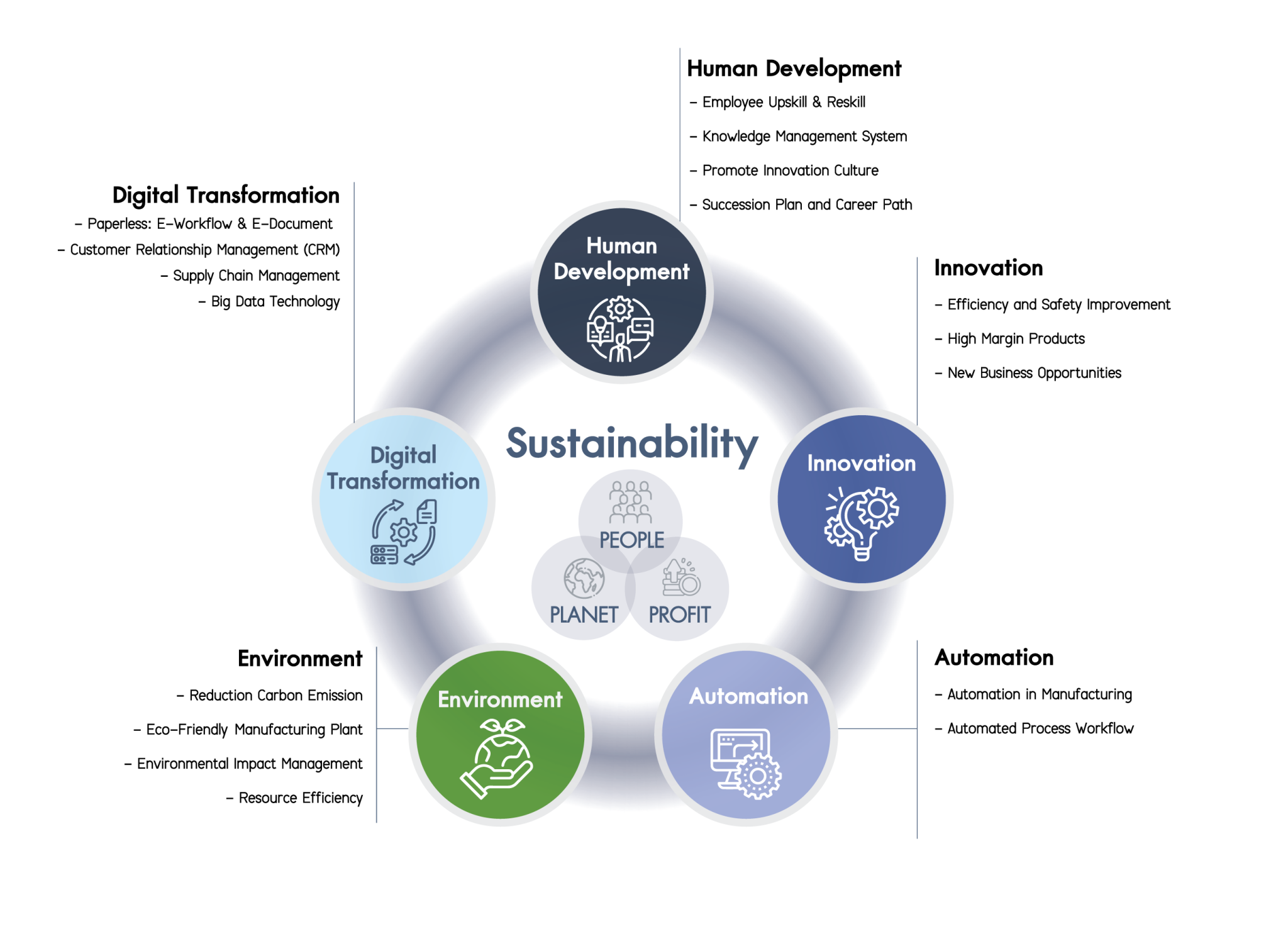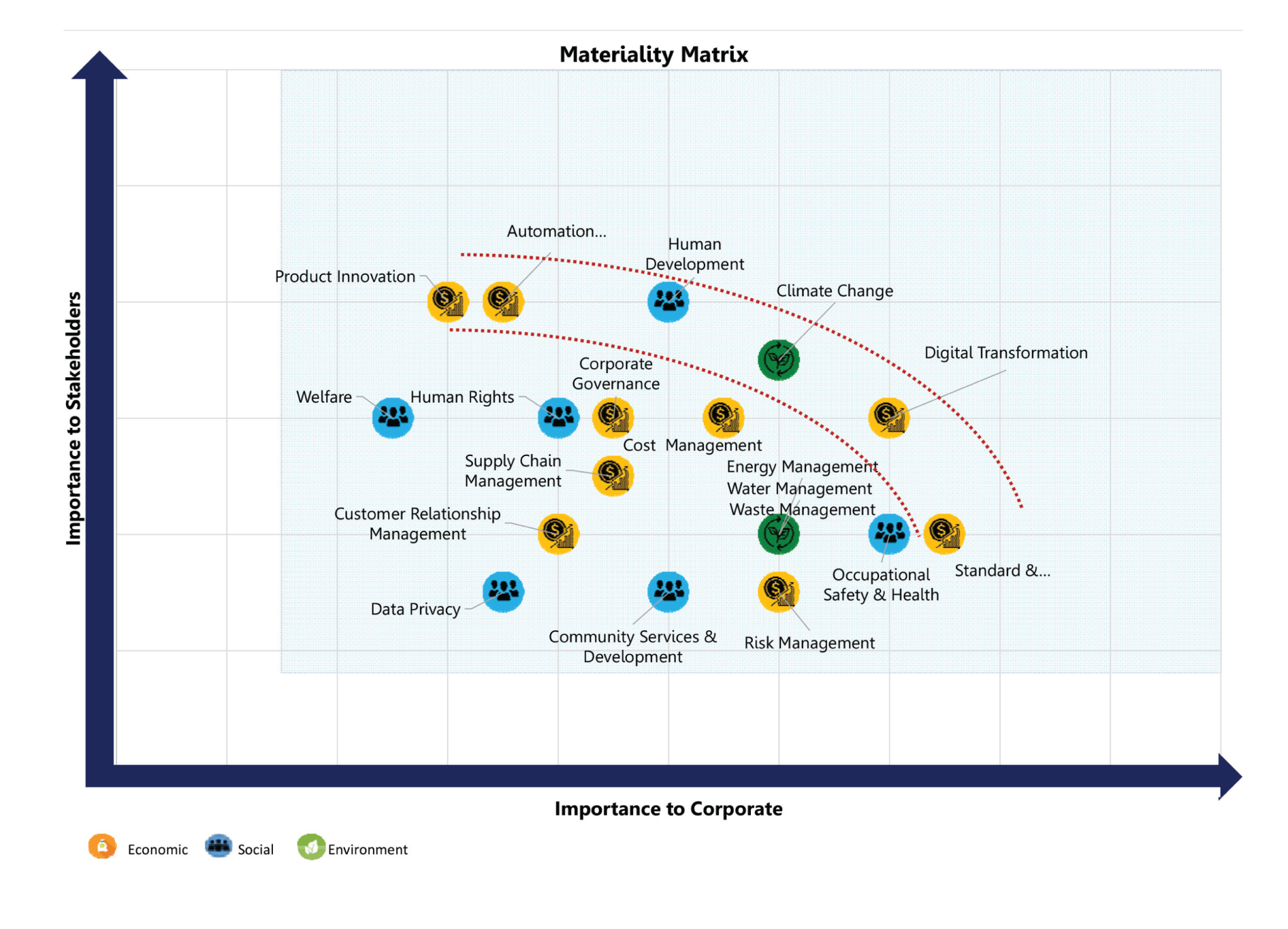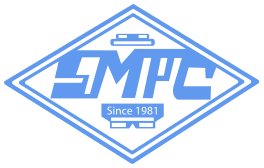Sustainability Strategy and Management
Policies and Sustainability Management Goals
To achieve the company’s vision, “Become One of the World Leading LPG Cylinder Manufacturer with environmental conservation for
sustainable growth”, the Board of Directors realizes and has a vision that the company’s business practices for creating added value, growing and achieving sustainable success, there needs to be a balance of economic, environmental and social aspects along with human rights considerations. The board also takes into account the stakeholders under ethics, good corporate governance, and sufficiency economy principles by His Majesty King Bhumibol Adulyadej the Great Borommanat Bophit. The Late King once gave a speech to the Thai people in 1974: to live under the principles of moderation, reasonableness, and immunity on the condition of “knowledge” and “morality”. It was integrated with the company’s business ethics and operating policies through the most efficient and effective activities.
The company has taken the principles together with sustainability issues into a strategic plan and guidelines for sustainability.
This responds to the United Nations Sustainable Development Goals (SDGs) by defining development directions for sustainability in 5 business areas, (5 Megatrends Towards Future Sustainability for SMPC) which cover the dimensions of economic, environment, and society.

Sustainability Strategy and Supporting
the UN Sustainable Development Goals
Materiality Assessments

The company has developed a process to work into digital systems in order to support a new normal work and life, hence more up to date and flexible. The company has established a policy to bring more digital systems to manage the company’s supply chain by implementing e-document and e-workflow to development working process, hence more convenience and les redundant. As a result, the company is able to respond to customer needs more quickly and reduce the use of resources.
The company is also aware of the importance of the security of its information systems, so a structured system is put in place to protect information securely on the network, as well as testing and inspecting the information security system to prevent unauthorized access to information. The company also focus on the personal information management by strictly compliance with the Personal Data Protection Act to protect the rights and freedoms of employees and stakeholders for all.

The company places importance on conducting business along with continual care for the environment. The company has adopted the ISO 14001: 2015, environmental management system as direction for operation, along with creating environmental policies, organizing activities and projects to instill in employees’ awareness and importance of the environment. The company has brought digital systems to work to reduce the natural resource usage. Besides, developing production processes to reduce waste generation and environment impact, including using a wet scrubber system in the production process can prevent the fumes and dust generated by the production process not to be emitted into the air, hence no effect on the environment. The silencers are also used in the production process. The company installed a sound suppressor and soundproof walls to reduce the noise generated by factory operations. Growing trees around the fence is to create a green area and also a sound proof. The company treats and reuses 100% of the water used in its production processes.
SMPC also takes into account the climate change that the world is facing, thus the company determined to operate its business with environmental responsibility. A working team has been established to manage the carbon footprint of the organization to set goals and guidelines for reducing greenhouse gas emissions. The company has reduced the use of electricity and used renewable energy from the solar rooftop power generation system instead, hence reducing greenhouse gas emissions, resulting in sustainable environmental protection.

The company has kept up with new technologies, and developed the production process continuously. The company has used robotic and automated production line systems into the production process, hence more consistent of the quality of work, more production efficiency, and less waste. The company also expands automation system in other processes, i.e., production plant and office station.

For the company to have sustainability, one of the factors is to innovate and create new innovations in products, services, working system and production process, to be able to reach and meet the needs of customers. In creating company innovation, the company takes into account the needs of customers, society, and environment by bringing opinions and problems of customers and stakeholders to develop products and services. For example, applying RFID to be used with LPG cylinders, this enables customers to record and utilize the information in various ways, including the circulating the cylinder, inventory management, traceability, etc. In addition, the company has developed the new product made from aluminum materials to meet the needs of customers who want lightweight cylinders, which are convenient to use and move, and difficult to get rusty. And at the end of its lifespan, the material can be 100% recycled.
Apart from using the innovations for products and services, the company also uses innovations in its production processes. There is research and development to improve the production process, adopting technology to stabilize production, making the best use of resources effectively and safely.

SMPC recognizes the importance of conducting materiality assessments to identify and prioritize key sustainability issues that impact its business operations. These assessments are aligned with the principles outlined in the Global Reporting Initiative (GRI) Standards and encompass environmental, social, and corporate governance aspects. The process involves the following three steps:
1. Identifying Key Sustainability Issues
SMPC analyzes both internal and external factors to identify important sustainability issues relevant to its business operations. This analysis takes into account the sustainability context and considers the needs and expectations of stakeholders throughout the value chain, both within and outside the organization. The scope of sustainability development is determined in alignment with the company’s business strategy.
2. Prioritization
The identified important issues from step 1 are prioritized based on the opportunities they present and the severity of their impacts on economic, social, and environmental values.
3. Verification of Issues
The prioritized issues are proposed to management for review as key corporate sustainability issues. The company ensures the accuracy and completeness of these issues, covering all aspects of the economy, society, and the environment.
Materiality Matrix
The company has taken into account issues related to business operations, including issues regarding to the expectations of all stakeholders throughout the business value chain, which is based on the principles of the Global Reporting Initiative (GRI) Standards. It will reflect factors influencing business operations in the areas of environmental, social and corporate governance. There are three steps of sustainability assessment as follows:

